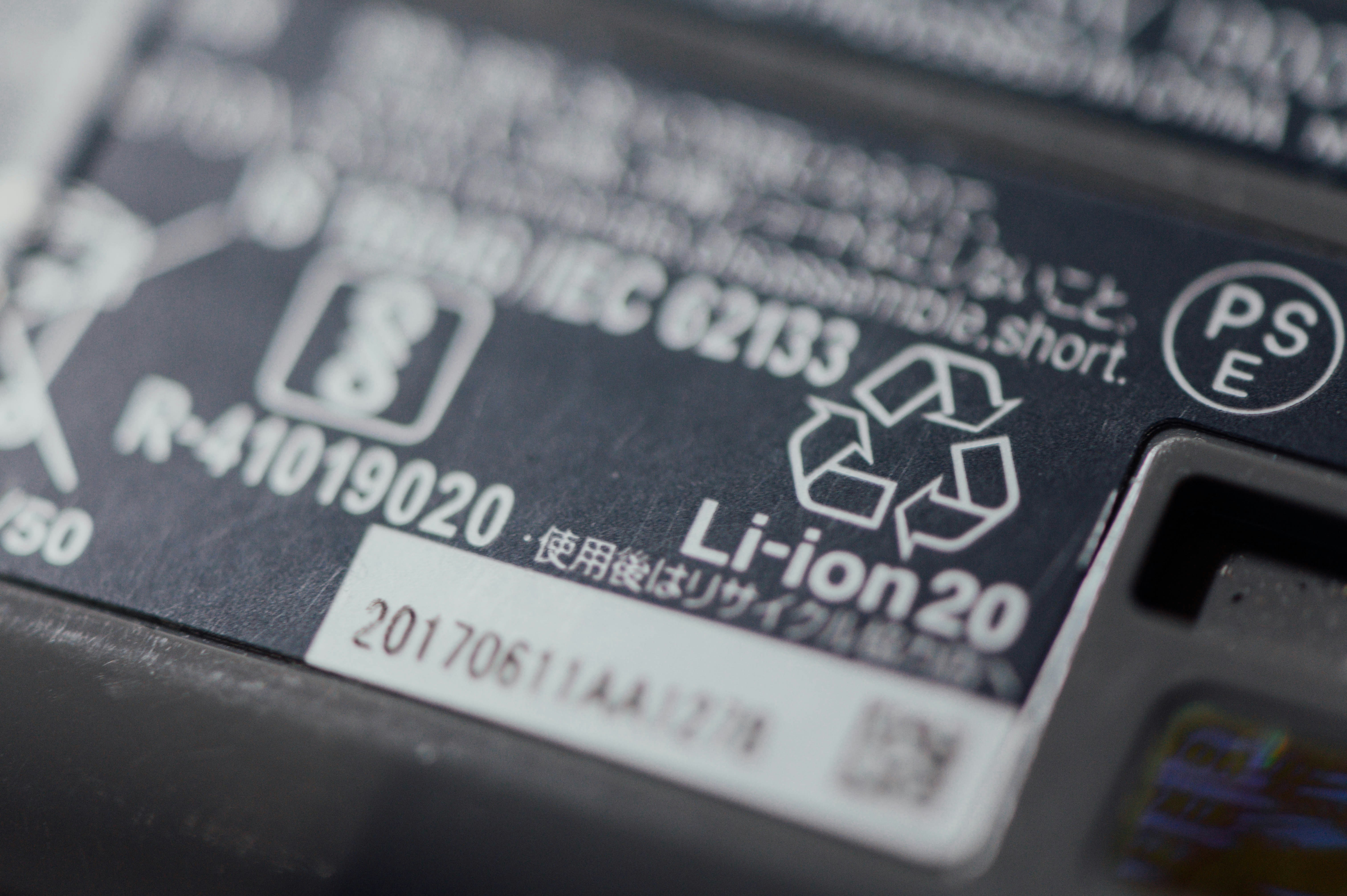New 2025 UK rules are changing how businesses handle battery and tech waste. This guide explains what the latest lithium-ion battery legislation means for compliance, fire safety and recycling.
Learn how First Mile helps you stay ahead with safe battery recycling, sustainable tech disposal and full e-waste compliance for businesses.
Nearly half of all waste fires in the UK are caused by lithium batteries thrown away incorrectly. From e-bikes and laptops to vapes and power tools, lithium-ion batteries are everywhere, and they’re becoming one of the biggest fire and compliance risks for UK businesses.
Changes to the rules in 2025 are tightening how businesses manage battery and tech waste. The focus on lithium battery disposal UK wide is growing as fire risks and compliance pressures increase.
These updates form part of broader battery disposal regulations UK 2025, designed to improve safety and sustainability across workplaces.
We’ll explain the current laws, what’s changed in 2025, and how to stay compliant and safe with help from First Mile.
Why lithium batteries are under fire literally and legally
Lithium batteries power much of modern life. They are found in:
- E-bikes and scooters
- Power tools
- Laptops and mobile phones
- Vapes and small electronics
These batteries are lightweight, rechargeable and efficient. But when handled incorrectly, they can be dangerous.

The problem
- In 2023, UK fire services attended more than 200 waste fires linked to lithium batteries.
- These fires made up nearly half of all waste fires in the country.
- The cost to the economy and environment is estimated at more than £150 million each year.
Why fires happen
- Lithium cells store large amounts of energy.
- When crushed, overheated or damaged, they can short-circuit.
- Short-circuiting causes a chemical reaction that can ignite or explode.
The pressure to act
Insurers and regulators are taking notice. Businesses must now treat fire safety and lithium batteries as part of everyday risk management. Fire safety officers are asking for clear procedures and safe storage.
The current laws on battery and tech disposal
To stay compliant, it helps to know what the law already says about how batteries and electronic waste should be handled. Several UK regulations set the standards for e-waste compliance for businesses of all sizes.
The Waste Electrical and Electronic Equipment (WEEE) Regulations
Updates to WEEE regulations in 2025 have strengthened the requirements for safe recycling and reporting:
- Separate collection and recycling of electronic waste
- Use of approved waste carriers and recycling facilities
- Record keeping for collection and disposal
WEEE law also means that batteries inside equipment, such as laptops or power tools, must be recycled safely rather than thrown away.

The Hazardous Waste Regulations
Lithium batteries fall under hazardous waste management frameworks, meaning strict handling and transport rules apply. They must:
- Be stored separately from general waste
- Be kept in suitable containers away from heat or water
- Be collected by licensed waste carriers
Incorrect handling can lead to pollution, fire risks and potential fines.
The Fire Safety Order 2005
Every workplace must assess and manage fire risks. That includes risks linked to the storage and disposal of lithium batteries. Businesses are expected to:
- Identify where batteries are stored or used
- Include battery fire risks in fire safety assessments
- Put measures in place to reduce ignition risks
Duty of care
Businesses have a legal duty to use licensed waste carriers and ensure their waste is treated responsibly. Using unlicensed operators can lead to fines or prosecution.
First Mile’s WEEE recycling and battery recycling services make compliance simple, with full documentation and safe, certified collection.
What’s changed in 2025: new rules and proposals
The way the UK manages batteries and tech waste is evolving fast. Fire incidents, environmental concerns and new technology have pushed the government to review how batteries are stored, transported and recycled.
The Lithium-Ion Battery Safety Bill
The Lithium-Ion Battery Safety Bill (2024–26) is being debated in the House of Lords. It aims to improve how batteries are handled throughout their life cycle. Proposals include:
- Fire-safe collection points at e-bike and scooter retailers
- Clearer labelling and segregation rules for used batteries
- Stronger requirements for recycling and recovery targets
If passed, this bill will make businesses more accountable for how batteries are stored and disposed of on their premises.
The influence of EU legislation
The new EU Battery Regulation, which came into effect in 2024, sets ambitious recycling and recovery targets. It also requires that batteries in new products are easy to remove and replace.
While the UK is no longer bound by EU law, these changes are likely to influence UK policy as the government seeks alignment for trade and safety reasons.
Extended Producer Responsibility
The UK is also exploring wider Extended Producer Responsibility (EPR) models for batteries and electronic equipment. This means producers and retailers could soon be required to cover the cost of collection and recycling.
What this means for your business
These changes signal a shift toward tighter oversight and shared responsibility. Businesses that use or sell tech should act now by:
- Reviewing how batteries and electronics are collected and stored
- Working with certified recyclers that meet fire safety and data protection standards
- Keeping up to date with regulatory updates from DEFRA and the Environment Agency
Proactive action today will make 2025 compliance simpler and safer.
How to stay compliant and safe: practical steps for businesses
Following the rules on paper is one thing. Putting them into practice across your workplace is where safety and compliance really happen. These steps will help you prepare for the latest requirements while protecting your people and property.
Set up safe battery collection points
Setting up internal collection bins is the first step towards safe battery recycling in your workplace. Create dedicated collection stations in offices, warehouses or retail spaces. This prevents batteries from ending up in general waste or mixed recycling.
What can go in:
- Everyday household batteries
- Laptop and power tool batteries
- E-bike and scooter packs
- Disposable vapes
What must not go in:
- Damaged, leaking or swollen batteries
- Batteries still attached to equipment
Store full containers in a cool, dry place, away from heat or flammable materials. Use approved battery collection bins for businesses to keep batteries separate and compliant.
First Mile tip: Our battery recycling service includes fire-safe collection pails and compliant transport to keep your workplace protected.

Partner with certified e-waste recyclers
Only use licensed waste carriers for electronics and battery recycling. This ensures full compliance with the WEEE and Hazardous Waste Regulations.
Choose partners that:
- Provide environmental and compliance documentation
- Offer data destruction for IT and hard drives
- Recycle materials to high environmental standards
First Mile helps with all of this. Our WEEE recycling and IT asset disposal services include secure data wiping and certificates of destruction for peace of mind.
Train your teams and review fire risk assessments
Everyone in your workplace should understand how to handle batteries safely. Include this in regular health and safety briefings.
Tips for safer workplaces:
- Add lithium battery risks to your fire safety assessment
- Train cleaners, office managers and staff to separate batteries correctly
- Use clear signage and labels for storage areas
- Keep containers in ventilated, accessible locations
Monitor upcoming legislation and policy updates
Battery regulation is changing quickly. Staying informed helps you plan ahead and avoid last-minute compliance issues.
Simple ways to stay updated:
- Assign a person or team to track battery and e-waste regulations
- Subscribe to DEFRA, HSE or Environment Agency updates
- Follow First Mile’s blog for expert guidance and recycling advice
How First Mile helps you stay compliant
Keeping up with changing waste and fire safety regulations can feel complex, but it doesn’t have to be. First Mile makes safe battery and tech recycling simple, sustainable and fully compliant.
We help thousands of UK businesses recycle batteries, electronics and IT equipment safely every year. Our services are designed to protect your people, your data and the planet.
What we offer
- Battery recycling with fire-safe collection pails and secure, licensed transport
- WEEE-compliant electronics recycling for everything from monitors to vapes
- IT asset disposal and data destruction with full certification
- Compliance documentation to support audits and sustainability reporting
We handle IT and electronics recycling with certified data destruction and full compliance documentation. Everything we collect is handled by licensed facilities, with zero waste sent to landfill.
With First Mile, compliance is simple, safe and sustainable. Our experts stay ahead of every regulatory change, so you don’t have to.
Stay ahead of 2025 battery rules and protect your business
The rise in lithium battery fires shows how serious this issue has become. Safe battery and tech disposal is no longer optional. It’s about protecting people, property and the planet while staying compliant with new 2025 regulations.
Businesses that act early will find compliance simpler, safer and more cost-effective. Reviewing your storage, training your teams and working with certified recyclers now means you’ll be ready for the changes ahead.
At First Mile, we make it easy to stay ahead of new waste and safety laws. From fire-safe battery recycling to secure IT disposal, we help you manage every step with confidence and care.
Start preparing for 2025 today. Visit First Mile’s recycling services to make compliance and sustainable tech disposal simple for your business.
FAQs
What are the new UK rules for battery disposal in 2025?
The UK government is reviewing how lithium batteries are stored, transported and recycled. The Lithium-Ion Battery Safety Bill aims to introduce stricter rules on labelling, storage and fire-safe disposal, with changes expected to come into effect between 2025 and 2026.
Can businesses throw small batteries in general waste?
No. Batteries are classed as hazardous waste and must be collected separately. Throwing them in general waste can cause fires and pollution. Always use a dedicated recycling container or arrange a collection with a certified provider such as First Mile.
How should used batteries be stored before collection?
Store batteries in a cool, dry place away from heat, moisture and flammable materials. Use a fire-safe container or battery pail, and never crush or mix damaged batteries with others.
What is WEEE and how does it affect businesses?
WEEE stands for Waste Electrical and Electronic Equipment. It requires businesses that use, sell or discard electronics to ensure safe collection, recycling and documentation through licensed recyclers.
Where can I recycle old tech securely?
You can recycle old electronics and IT equipment through certified services like First Mile’s IT recycling and data destruction programmes. These ensure your data is wiped securely and materials are recycled responsibly.


